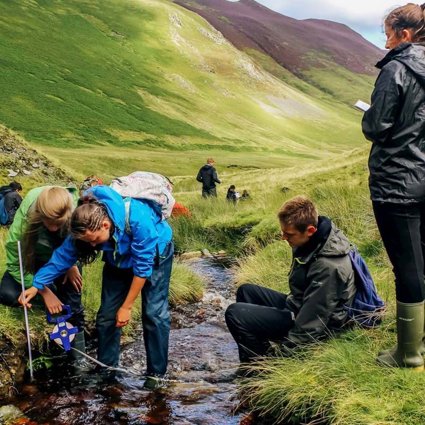
Preparation Checklist
The aim of this list is to cover the most common practical aspects of fieldwork preparation. Teachers should read it with the understanding that particular aspects of the list may not apply to their school and the circumstances of their fieldwork, and though relatively comprehensive, the list is equally not exhaustive and teachers should add further points to the list to suit their own fieldwork experiences.
It is also important to note that not all of these tasks need to be completed by the trip leader – many tasks can be shared amongst colleagues in the department and department leads should also coordinate with the school’s Educational Visits Coordinator (EVC), if there is one, as many of these tasks would automatically fall under their job description.
In the year before the fieldwork
-
Seek approval from SLT and confirm the dates of the fieldwork with the school diary holder.
-
Arrange a meeting with the school’s EVC and establish who will be responsible for the different aspects of the fieldtrip preparation and planning.
-
Cost the fieldtrip and decide how much of a contribution, if any, will need to come from parents.
-
If the fieldwork is residential, arrange an information evening for parents and set a date in the school calendar for this. It may be possible to tag this onto an existing parents’ evening.
In the term before the fieldwork
-
Make a detailed ‘lesson plan’ for the fieldwork day, including timings, the sizes of working groups and how students with SEND will access the learning.
-
Establish with colleagues what assessment material students will produce as a result of the fieldwork day (such as a report, a completed workbook etc.).
-
Check how many staff you will need to take with you in order to satisfy the school’s pupil to staff ratio.
-
Recruit staff to join you for the fieldwork day, ensuring at least one is a qualified first aider.
-
Book transport if necessary and inform the coach company if students might be wet / sandy / muddy as a result of the fieldwork (this can affect the type of vehicle they allocate to the job).
-
Send a letter home to parents informing them of the fieldtrip, any cost to them, any special circumstances they would need to know about and what students should bring with them. If necessary, include a parental consent form.
-
If the fieldtrip is residential, hold a parents meeting with the chance for them to ask questions.
-
Check you have enough pieces of fieldwork equipment and buy, hire or make additional items as needed.
-
Conduct a recce of the field site, paying close attention to
-
Where coaches / minibuses might be able to drop off and pick up students safely.
-
Where coaches / minibuses will be able to park during the fieldwork (and how much it will cost).
-
The location and state of toilets which students will be able to use.
-
Areas where mobile phone signal is weak or non-existent.
-
An area suitable to use as a base while the students eat their lunch.
-
Places where students may be able to refill water bottles.
-
Potential risks and hazards.
-
-
Write your risk assessments for the fieldwork day and submit these to your EVC / SLT for approval.
In the week before the fieldwork
-
Discuss in more detail with students what they will be doing on their fieldwork day.
-
Revise any key geographical theories and concepts with students that might aid their understanding of the fieldwork they will be doing.
-
Carefully outline the toilet arrangements for the day, especially if opportunities to use toilets will be dependent on where exactly students are at different times.
-
Show students the fieldwork equipment they will be using, how they work and how they should be handled.
-
Give students time to practice using field equipment and undertaking the fieldwork tasks in the school setting.
-
Check the weather forecast for the fieldwork day and advise students and supporting staff of any weather conditions that would affect what clothing and footwear they should bring with them.
-
Decide if students should be in full uniform / PE kit / own clothes for the fieldwork and communicate this to students.
-
Make copies of any paper materials needed in the field such as workbooks or data collection sheets.
-
Make multiple copies of the risk assessments and fieldwork plan so there is enough for one per staff member.
-
Hold a briefing with any staff from outside the department who will be supporting you during the fieldwork day. Make sure this includes any TAs and staff who support students in a one-to-one capacity.
-
Ensure all staff have a copy of the risk assessments and emergency procedure and encourage them to ask any questions if there is anything they are unsure of.
-
Book a school emergency mobile phone.
-
Sign out a first aid kit(s) from the school office.
-
Reconfirm pick up and drop off times and locations with any external transport company being used.
-
Let the school kitchen know about any students who will require a lunch bag on the day of the fieldwork (those who would normally receive a free school meal).
-
Chase up any student whose parents are yet to provide confirmation / consent.
-
Prepare any cover materials needed while you are out of the classroom.
On the day of the fieldwork
-
Get in early and amass the fieldwork equipment as close to the transport pick up point as possible.
-
Pick up lunch bags from the school kitchen for those students who would normally receive a free school meal.
-
Check that your colleagues (especially those from other departments) have everything you are expecting them to carry (such as first aid kits, risk assessments, fieldwork plan etc).
-
Sign out any epi-pens (or similar) held by the school and check that the necessary students are carrying their own in their bag.
-
Make sure students have written down the school emergency mobile number.
-
Do regular head counts as you move between activities.
-
Take photos to post to the school’s twitter account or for the school website.
After the fieldwork
-
Produce articles for the school newsletter, display boards for open day, assembly materials etc. to highlight the value of the fieldwork and the fun that was had.
-
Thank (in a staff meeting if possible) those additional members of staff who joined your department on the day to make the fieldwork possible. Consider giving a small gift and card to show your gratitude.
-
Arrange with SLT a meeting to discuss the dates for the same fieldwork the following year.
Go to next section: Useful Equipment and PPE

